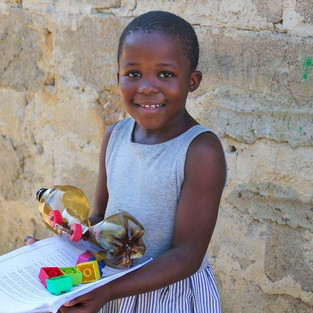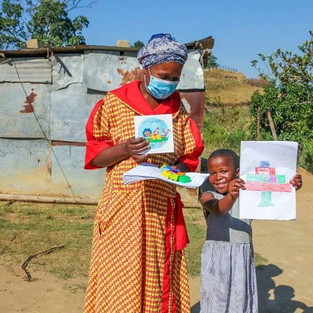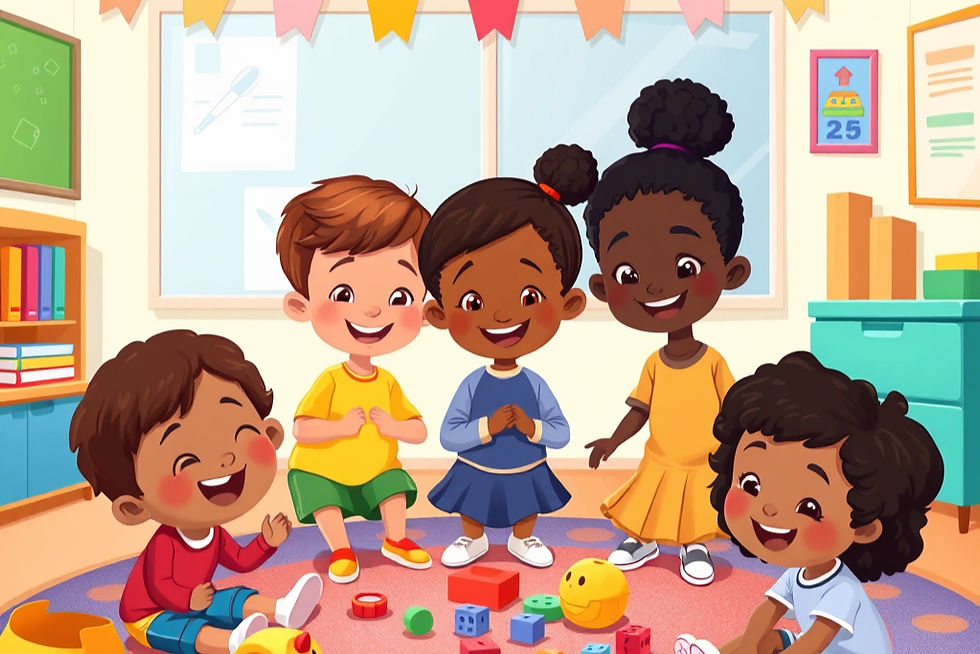Thanda brings learning through play to homes in the hills of rural KZN
- Jun 22, 2020
- 4 min read
During this time of the Covid-19 pandemic our partner THANDA, based in Mtwalume in rural KZN, has seen “Every day on the ground, how new challenges bring the potential for new solutions.” This is the story of their successful new Learning at Home Programme, that they have integrated Six Bricks activities into.
“When Covid-19 hit South Africa, Thanda’s team started with prevention education and providing tippy taps. We then built an online Education Portal and set up a whatsapp/ SMS system to send educational activity ideas to guardians.
However, it was in April when we started delivering monthly food parcels to each and every child in our programmes- to date we have distributed 78 652kg of food- that something magical started to happen…
We met grannies that had just spent their last R20 to buy soup with pension payouts still two weeks away - others that were on their way to a loanshark– and others that were simply lost for a solution. We found that there’s something incredibly connective about global uncertainty coupled with meeting someone at their most vulnerable. While these grannies have more strength than one can quantify and more love for their children than one can imagine, they were hungry and stressed. The food parcels we brought were met with laughter, tears, and relief. As one grandchild, Luyanda Khambuhle expressed, “I was so happy in a way that I pushed a wheel barrow filled with food parcels over a steep hill without feeling any heaviness. Whereas on other days, the hill becomes too steep especially when travelling to school.”
When we delivered these first food parcels, we also handed out every crayon, pair of scissors, paper, and lego block we could find at our Community Centre. The relief from receiving food coupled with the educational resources and daily SMS messages prompted guardians to start talking… and they talked! They told us how through these difficult times, they had come to realise that Thanda truly cared about their children. And suddenly, instead of the stiff, overwhelmed faces we usually see at monthly guardian workshops at Thanda or quarterly meetings at schools, we saw warm smiles and glimmering eyes of partners who felt truly supported and empowered within their own space. They started to show us what educational activities they had been doing with their children based on the SMSs sent and they asked questions about the challenges they were facing. Most parents and guardians in our community are not usually involved in their child’s education- they wait for the child to bring a report card home from school, believing that education can only happen within those walls. We realized the pandemic and our response to it had created a seismic shift, and we saw an opportunity….
So we gathered together our programme developers, long-standing facilitators, and managers to create a new initiative called Learning at Home. It is based off Thanda’s current curriculum, but directed to children at home – and facilitated by their own guardians!
Each week since April, we have visited 745 children at their households, dropping off an Education Pack to enable them to learn. Andiswa Kunene (above receiving the household pack for the week) and her brother Andile (above reading the book that formed the theme for all the Learning at Home activities that week) are now taught at home each day by their mom, Zethu. Andiswa and Andile usually attend Sosukwana Primary School and participate in Thanda’s After-school Programme. Zethu explains that lockdown has really changed things in their household “I now spend more time with them (her three children) than before, it’s fun just to be with them for this long, it’s really nice” she says.
Through letters to the guardians at the start of each pack (to explain the role of fun and play in learning) and weekly in-person visits to discuss their questions and challenges, guardians have an increased understanding of the Thanda methodologies, specifically our focus on creativity and play as a learning tool. We are seeing that guardians are now whole-heartedly embracing exploration and play as valid methods of learning (Andile can be seen clutching his ‘invention’ above). Where they might previously have thought that certain games were a waste of time, a hands on approach allows them to see and experience the lessons and benefits for themselves.
Zethu elaborates “The kids go to school to learn but the teachers don’t have time to play with them whereas Thanda is able to use play to teach them which makes it easier for the kids to remember things they learn through play. Because they love it, they don’t easily forget it. We are grateful to Thanda for what they’ve done.”
Of the lessons sent through the Learning at Home Programme so far Zethu identifies a few specific ones as being favourites among her children “they enjoyed learning shapes through playing hop scotch - we learnt about squares, circles and triangles. They also learnt how to aim. If they missed their target, I would encourage them to try again and show them how it is supposed to be done.”
Getting involved on the child’s level is a sign of an excellent teacher and Zethu is one of many guardians who have embraced this role whole-heartedly with the help of our Learning at Home Programme.
Every day on the ground, we see how new challenges bring the potential for new solutions.























Comments